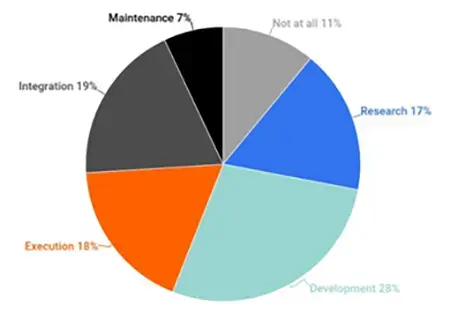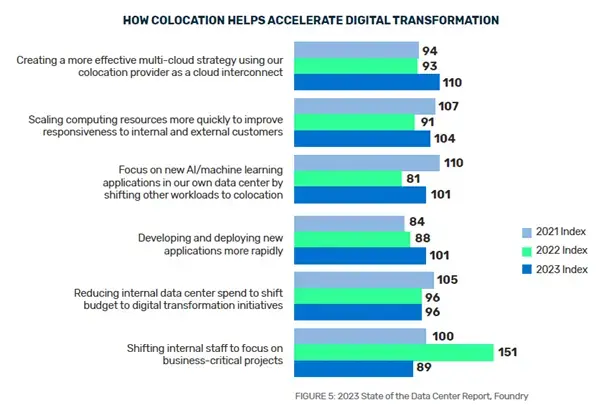
Use 2023 State of Data Center Report to Guide 2024 IT Modernization
Digital transformation (DX) has been a headline for years. Aren’t companies done already? The fact is businesses are at all stages of DX, which we are often referring to as IT modernization. Seventy percent of organizations either have a DX strategy or are currently working on one.1 Yet only 7% of companies report they have fully implemented DX and are now in the maintenance phase.2

Maintenance isn’t a stop sign. It signals ongoing fine-tuning. Let’s face it, DX is never really over. Everything keeps changing – strategies, the marketplace, operational challenges, technology and customer preferences.
DX and digital resilience go hand-in-hand. Resilience is a very big deal in context of cyberattacks, legacy infrastructures, disruptive technologies, environmental hazards and so on. It’s smart to view resilience as the path to longevity.
Spending on DX is forecast to reach $3.4 trillion in 2026 with a CAGR of 16.3%.3
How Colocation Helps Accelerate Digital Transformation
We collaborate with Foundry/CIO (formerly IDG) on the State of the Data Center report. Now we have three years of responses about colocation and how it helps accelerate DX. The highest ranking responses by year are:
- 2021: Reducing internal data center spend to shift budget to DX initiatives
- 2022: Shifting internal staff to focus on business-critical projects
- 2023: Creating a more effective multicloud strategy using our colocation provider as a cloud interconnect

Interconnection has become more important for reasons that are explored in the report, but we’ll give you a sneak peek. Interconnection connects your colocation infrastructure, public cloud services and an ecosystem of service/solution providers with high speed and low latency. Whether physical or virtual, dedicated connection is the fastest interconnect available. Some businesses still use the internet, which can be appropriate for their needs; for others, it can be too slow and unreliable.
Direct connection checks the boxes for several DX objectives:
- Evaluating options to determine where you want to host workloads and easily move workloads from one cloud to another.
- Moving data quickly between your colocation and public clouds – a potential competitive advantage.
- Expanding private cloud capabilities to add temporary capacity in response to bursting.
- Simplifying hybrid IT infrastructure management with multivendor interconnection for public and private clouds.
- Engaging with digital ecosystems of businesses that can help you with automation, cybersecurity, disaster recovery, managed services, edge strategies and more.
The more boxes you check, the more you increase agility and resilience. These capabilities can help you recover quickly from unexpected events and respond swiftly to new opportunities (generative AI, anyone?). Agility may be an overused word, but when you have it, you’re ahead in the game.
But Wait, There’s More Value Beyond Interconnection
The 300 IT executives in the 2023 State of the Data Center Report say they receive value from colocation data centers beyond improved connectivity. One area is physical security. Things like biometric screening, restricted access and video surveillance add layers of security on top of a facility’s redundant systems and compliance best practices.
Profits and operational expenses are another point. By moving critical workloads from public clouds to colocation, you can scale cost-effectively in support of go-to-market efforts. And, high-performance computing and edge computing can make a big difference in data capture, analytics and decisions. “Recalibration,” a new way of saying “repatriation,” factored into the discussion in 2023 and surely will be a top priority in 2024.

Know More
Which workloads top the list of workloads being moved to colocation? What is the No. 1 thing that IT leaders want from colocation? Check out the 2023 State of the Data Center Report to find out and keep an eye out for the 2024 State of the Data Center Report.










